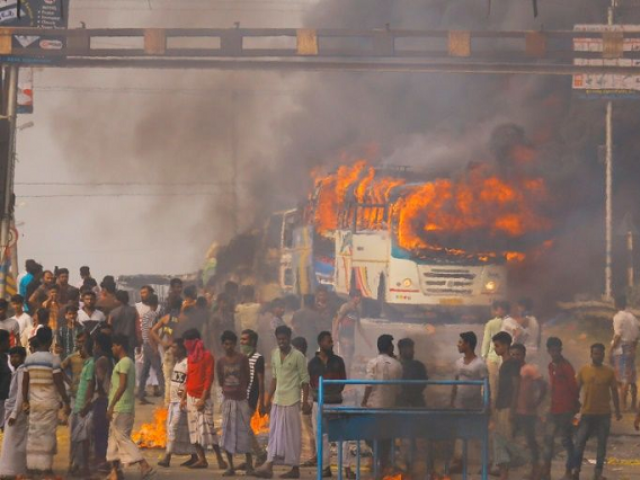India and the outsiders
Much like installing barbed wires, India has set in motion discriminatory laws

PHOTO: REUTERS
Passed by India’s Parliament on December 11, the CAB grants Indian citizenship to religious minorities that migrated to India from Afghanistan, Bangladesh and Pakistan. On the surface, it’s an initiative of the Modi government to offer sanctuary to persons fleeing religious persecution. However, the bill only grants non-Muslims accelerated citizenship, denying the same to Muslims. With such a bill, PM Modi is attempting to reshape India into a Hindu rashtriya. This clearly contradicts the pluralism and secularism espoused in the Indian Constitution.
Such overt discrimination against Muslims seems to be a continuation of a process unleashed by the BJP in its first term, including mass conversions to Hinduism (ghar wapsi), changing Muslim street names, and allowing cow vigilantes to lynch Muslims. But CAB is particularly worrying because xenophobia has now begun to take a legal shape.
The Modi government secured 311 votes in support of the bill against 80 in Lok Sabha (lower house), and 125 votes against 105 in the Rajya Sabha (upper house), setting a worrying precedent. The question is: will BJP legislators continue to enact laws that contradict the historical ethos of the Indian polity?
The Modi regime is following the vision of MS Golwalkar, the ideological guru of the Rashtriya Swayamsevak Sangh (RSS). Essentially, the bill fits neatly with Modi’s RSS-driven Hindutva ideology. In some of his most cited works, Golwalkar wrote of how he saw outsiders (Muslims) threatening his motherland, a nation he felt was built for Hindus. The Muslims, he wrote, would never serve the motherland earnestly.
The CAB is not just anti-Muslim. The people in Assam are resentful of granting citizenship to migrants from neighbouring countries on grounds that their political, linguistic, cultural and land rights are threatened. In Assam, two million residents were declared illegal and excluded from the National Register of Citizens (NRC) because they could not prove they had settled there before the creation of Bangladesh. Interestingly, the bill is being viewed to accommodate non-Muslims who would otherwise be excluded from the NRC, like the Bengali Hindus — a strong BJP voter base.
This means that the Modi regime is taking steps that would polarise its population along ethnic and religious lines, making some feel like outsiders. Naturally, this is troubling to those who had always taken pride in being part of a pluralistic and tolerant society. Some however feel India was never truly secular. The RSS ideology pre-dates the Partition and has become main stream in the last few decades. The BJP first used the 1992 demolition of the Babri Mosque to shore up its Hindu vote bank. In Gujrat, Modi and Amit Shah supervised the mass killings of Muslims, the gory details of which were uncovered by an investigative Muslim journalist, Rana Ayyub.
One cannot help but recall a short story, by Nadine Gordimer, of a family that lived in perpetual fear and suspicion of the people outside their neighbourhood. They were different from them — outsiders. To protect themselves, the parents built large fences with barbed wires and installed alarm-protected gates. One day, as their son went out to play, he trapped himself in the barbed wire and bled to death. He died, ironically, of the barriers that were built to protect him.
Today, much like installing barbed wires, India has set in motion discriminatory laws. For such a diverse country, this is worrying. When discriminating against the “outsiders”, India is only hurting itself.
Published in The Express Tribune, December 22nd, 2019.
Like Opinion & Editorial on Facebook, follow @ETOpEd on Twitter to receive all updates on all our daily pieces.













COMMENTS
Comments are moderated and generally will be posted if they are on-topic and not abusive.
For more information, please see our Comments FAQ